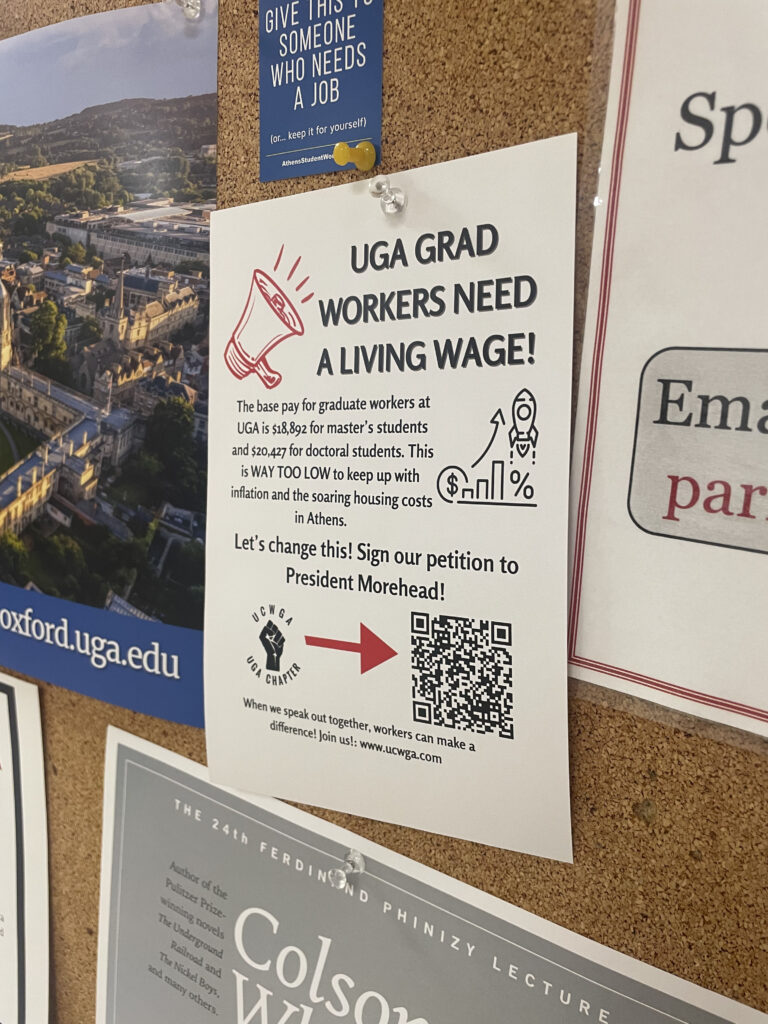The United Campus Workers of Georgia at UGA — the only labor union on campus representing University of Georgia employees — continues to fight for fair pay for graduate students as one of its policy priorities this year.
The group, which goes by UCWGA-UGA, argues that graduate workers provide critical labor for the university through tasks like teaching crucial introductory courses and conducting research, yet they are not fairly compensated for their labor.
“No one could graduate from UGA without us,” said Mikaela Warner, co-chair of UCWGA-UGA and doctoral student in the English department. “We’re teaching people the basic skills of writing at a college level so that they can go succeed in their majors. And, if we’re doing such essential work, why are we struggling to scrape by if we know the university’s making millions and millions of dollars of tuition off of our labor? Why are we begging just to survive?”
Why It’s Newsworthy: Labor movements are mobilizing workers across the country with prominent actions like the United Auto Workers and SAG-AFTRA strikes. In Athens, United Campus Workers of Georgia at UGA is mobilizing around issues like increasing graduate worker pay and free parking for UGA employees.One reason the union is focusing on graduate pay is that the cost of living in Athens is outpacing graduate worker pay, Warner said.
I mean, I feel it,” Warner said. “It was manageable in 2019. It’s not manageable.”
According to MIT’s Living Wage Calculator, the annual income required for living wage for one adult in Athens-Clarke County is $33,874 before taxes.
Pay can vary across different graduate programs, but is often below the living wage calculation. During the 2022-2023 academic year, the College of Family and Consumer Sciences paid master’s students $20,334.28 and doctoral students $21,975.95 for 20 hours of work per week. In the English department, master’s students were paid $17,661 and doctoral students were paid $18,778.
One component of this living wage calculation is housing expenses. The price of a house in Athens has increased by 35% since the start of 2020, Jeff Humphreys, director of the University of Georgia’s Terry College of Business’s Selig Center for Economic Growth, told Flagpole.

UCWGA-UGA is prioritizing higher graduate worker compensation in part to address rising costs of living.
“I got my master’s here several years ago, and the grad students’ stipend was a lot lower than it is even now,” said Thomas Sheehan, a doctoral student in the entomology department who joined the union this year in hopes of advocating for higher graduate worker compensation. “I’ve started to get involved here because I still think that the graduate students’ stipend is way too low. And it makes it difficult for people who are currently graduate students, but it also acts as a barrier to people who want to become graduate students. So I want to get involved to address that.”
Graduate students are unioning not just a UGA but at higher education institutions across the country. According to 2021 research by the City University of New York, graduate worker unionization increased by more than 32.5% from 2012 to 2019.
Not increasing graduate worker compensation comes at a cost to the university, said Bryant Barnes, co-chair of UCWGA-UGA and doctoral student in the history department.
“When top quality graduate students find out how little the pay is compared to other colleges, they go there instead of UGA,” Barnes said. “So UGA is effectively kind of turning away some of the top quality graduate students who might not be able to really kind of make it by or don’t have other kinds of support networks that more fortunate grad students do.”
Some graduate workers, such as doctoral student in advertising and public relations Grace Adams, say they feel fairly compensated for their work. However, Adams lives with another person to help split costs like rent and food which she says helps her live off her stipend.

Abigail Grimes, president of the Graduate Student Association and graduate student in the School of Social Work, says she hears from graduate students across degree programs about their challenges living off a graduate worker’s income, especially when students have to forgo higher paid opportunities in lieu of unpaid or lower paid graduate student work opportunities required for their program.
“There definitely is this acceptance — that’s just what college is like, that’s just what being a graduate student is like — you know, you struggle,” Grimes said. “I don’t love that because I think that doesn’t give us a reason to improve. And the fact that, like, there are food pantries for grad students. And I love that those resources are there. But I think we need to look at, like, why would grad students need to use those if they’re contributing meaningfully to the university?”
Bridget Goodman is a second-year student majoring in journalism and comparative literature.







Show Comments (0)